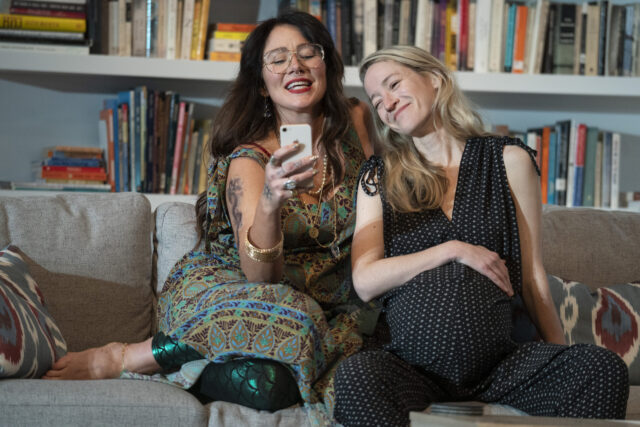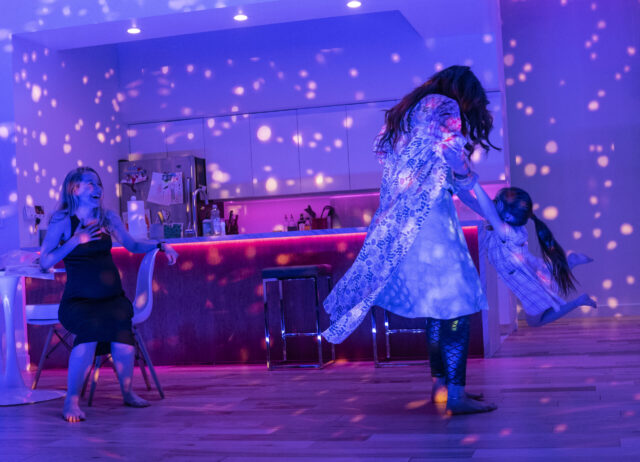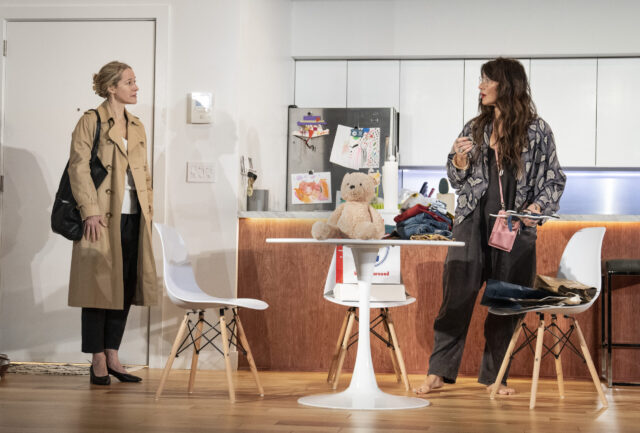
Ashling (Lynn Collins) and Mary (Brooke Bloom) share a fun moment in Lucy (photo by Joan Marcus)
LUCY
Audible Theater’s Minetta Lane Theatre
18 Minetta Lane between Sixth Ave. and MacDougal St.
Monday – Saturday through February 25, $57-$97
www.audible.com
Writer-director Erica Schmidt’s latest work, Lucy, is one of the best plays of the season, a gorgeously rendered story about a single mother, a nanny, and a young girl. Her Mac Beth, a stirring adaptation of the Shakespeare classic reimagined with an all-female cast set at a girls school, was one of the best productions of 2019, and equally feminist. Schmidt now moves from the bloody battles of medieval Scotland to twenty-first-century upscale urban domesticity, but Lucy nevertheless references classic themes.
The nanny is a staple of literature, theater, and film, from Mary Poppins, Mrs. Doubtfire, Maria Reiner (The Sound of Music), and Becky Sharp to Nanny McPhee, Nanny Schuester (The Nanny Diaries), Anna Leonowens (The King and I), and Mrs. Baylock (The Omen). In the 1965 Hammer horror flick The Nanny, Bette Davis starred as the thoroughly wicked title character who remains unnamed; just calling her Nanny is frightening enough.
Lucy, which continues through February 25 at Audible’s Minetta Lane Theatre, opens with pregnant fortysomething Mary (Brooke Bloom) interviewing Ashling (Lynn Collins) to take care of Mary’s six-year-old daughter, Lucy (Charlotte Surak), and soon-to-be-born son, Max. Mary is desperate; she’s a radiologist with a complicated work schedule and is due to give birth in a week. Mary wants to find the right fit, but she overlooks a few possible warning signs during her meeting with Ashling. Both the character and the audience do a double take at several things Ashling says, but nothing seems too ominous.
“I get it. You need a coparent,” Ashling declares after Mary describes her hours. “Someone who is here when you’re at work.” Mary responds, “Who I pay to be here. A nanny,” asserting that she is the mother.
Mary hires Ashling — who is fifty-eight but looks at least two decades younger, and acts even younger than that — and at first everything appears to be great. The nanny goes above and beyond the call of duty, especially with Lucy, who immediately adores her. At one point Ashling is swinging Lucy around as they both sing to Taylor Swift’s “Anti-Hero,” belting out, “I should not be left to my own devices / They come with prices and vices / I end up in crisis (tale as old as time) / I wake up screaming from dreaming / One day I’ll watch as you’re leaving / ’Cause you got tired of my scheming / (For the last time) / It’s me, hi / I’m the problem, it’s me / At teatime, everybody agrees / I’ll stare directly at the sun, but never in the mirror / It must be exhausting always rooting for the anti-hero.”

Mary (Brooke Bloom) watches as Ashling (Lynn Collins) and Lucy (Charlotte Surak) dance to Taylor Swift (photo by Joan Marcus)
As time passes, there are more cracks in the mirror as Mary begins noticing some curious behavior by Ashling, who has a feasible explanation for everything. Is Ashling gaslighting Mary? Is Mary so overworked and stressed that her imagination is getting the best of her? It all comes to a head, leading to an utterly thrilling finale.
Lucy takes place in Mary’s kitchen/dining room/living room, with shelves filled with books, cabinets with dishes and bottles of wine, and a comfy couch and chair. There is no television anywhere — “I don’t do screens,” Mary tells Ashling. Mary’s bedroom is off stage right, while a hallway at the center back leads to Lucy’s and Max’s rooms. (The clean, mostly white, instantly Instagrammable set is by Amy Rubin.) Mary primarily wears tastefully minimal but obviously expensive black and cream outfits, while the tattooed Ashling is draped in layers of swirly boho prints, every arm and finger sporting inexpensive arty silver jewelry, courtesy costume designer Kaye Voyce.
The creepier the plot gets, the more Cha See’s lighting casts long, eerie shadows, while Justin Ellington’s sound includes plenty of crying and screaming.

Mary (Brooke Bloom) and Ashling (Lynn Collins) face off in Audible production at the Minetta Lane (photo by Joan Marcus)
Schmidt (Cyrano, All the Fine Boys) has her finger on the pulse of the relationships between Ashling and Mary, Mary and Lucy, and Lucy and Ashling, letting each play out in its own way. The underlying fear Mary has about having hired the wrong nanny is palpable; at least at the start, most mothers are terrified of leaving their children with a complete stranger, references or not.
Bloom (Everybody, Cloud Nine) embodies that fear, evoking the young mother in Rosemary’s Baby, who thinks the devil is after her infant. Collins (Hamlet, The Merchant of Venice) exquisitely captures the many mysteries of Ashling, who harbors plenty of secrets. Schmidt exploits our misgivings by imbuing Ashling with some tantalizing witchlike tendencies. When Mary asks her what she likes most about child care, Ashling proclaims, “It keeps me young!” and it’s an easy leap to the age-old idea that she is somehow sucking the youth from her charges. (Mary responds, “That’s funny. My daughter is definitely making me old. Fast.”)
When Mary asks if she ever wanted her own kids, Ashling replies, “I have kids!” There’s also a perfume that could be a magic potion, a curious substance around Max’s crib, and other subtle touches that make us question whether Ashling is really up to something or if it’s Mary’s paranoia. Mary might be a radiologist who peers inside people’s bodies, but that doesn’t mean she can assess what’s going on in Ashling’s head.
Most of Schmidt’s work has a strong feminist undercurrent, and Lucy is no exception, with Mary a doctor who cannot easily afford a nanny and who gets only four weeks’ maternity leave, which she has chosen not to fight in order to keep her job.
Finally, it’s intriguing that the play is named after the six-year-old girl, who is splendidly portrayed by Surak (Waitress) but has the least amount of stage time. It’s as if Schmidt is telling us that Lucy is the future while also hearkening back to the first fossil skeleton of a human ancestor ever discovered, which archaeologists named Lucy.
In the five years it has been producing plays at the Minetta Lane, Audible has concentrated primarily on one-person shows starring women, including Carey Mulligan in Dennis Kelly’s Girls & Boys, Lili Taylor in Wallace Shawn’s The Fever, Jade Anouka’s Heart, Faith Salie’s Approval Junkie, and DeLanna Studi’s And So We Walked: An Artist’s Journey Along the Trail of Tears. (Men have been represented by Aasif Mandvi’s Sakina’s Restaurant and Billy Crudup in David Cale’s Harry Clarke.) In addition, Laurie Gunderson’s two-character The Half-Life of Marie Curie told the inspiring story of Madame Curie and her friendship with fellow physicist Hertha Ayrton.
Lucy, which passes the Bechdel test with flying colors, follows in that tradition while also reaching the next level. As Swift sings in “Midnights”: “Ladies always rise above.”